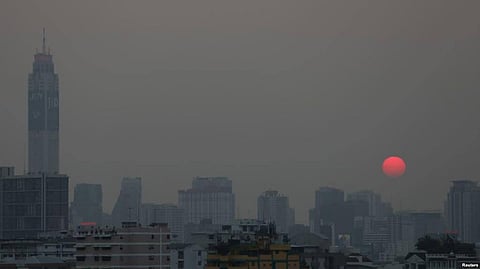
- Union Budget 2026
- Home
- NewsGram USA
- India
- न्यूजग्राम
- World
- Politics
- Entertainment
- Culture
- Lifestyle
- Economy
- Sports
- Sp. Coverage
- Misc.
- NewsGram Exclusive
- Jobs / Internships

Experts from around the world will gather in South Korea from Monday for the 48th session of the UN body Intergovernmental Panel on Climate Change (IPCC) to consider a special report on global warming of 1.5 degrees Celsius.
The report, titled Global Warming of 1.5AoC, a major scientific undertaking on the latest climate change research will speak on the impacts of global warming of 1.5 degrees above pre-industrial levels and related global greenhouse gas emission pathways.
Follow NewsGram on Instagram to keep yourself updated.
It will give policymakers the scientific information they need to make sound decisions and act to strengthen the global response to the threat of climate change, sustainable development, and efforts to eradicate poverty.
The report, slated for October 8 release, was commissioned by governments after the UN climate change meeting in Paris in 2015 when it was agreed to act to limit increases in global average temperature to less than 2 degrees Celsius above pre-industrial levels and to try keeping that increase nearer to 1.5 degrees.
A fisherman stands on his boat as he fishes at the Tisma lagoon wetland park, also designated as Ramsar Site 1141 in the Convention on Wetlands, in Tisma, Nicaragua. VOA
The report findings will come up for approval at the IPCC plenary that will conclude on October 5.
The IPCC is the UN body for assessing the science related to climate change.
Commenting on his expectations for the report, Least Developed Countries Group Chair Gebru Jember Endalew said: "It will be important that the report and the summary for policymakers clearly set out the scientific necessity of limiting global warming to 1.5 degrees Celsius as opposed to two degrees to protect people and the planet and highlights the vast discrepancy between this goal and our current global emissions pathway.
"In doing so, the report will shine a spotlight on the scale of the challenge the international community must rise up to meet. A future where warming is limited to 1.5 degrees is a brighter future for all."
Waves from Hurricane Florence pound the Bogue Inlet Pier in Emerald Isle, N.C. VOA
The globe may miss the mark to achieve the Paris climate goals, warned the leaked IPCC final draft of the report that was shared with governments in June.
The leaked draft said a vast majority of nations, including disaster-facing India, we're missing the mark in achieving the goal set at the Paris Agreement to limit global warming to 1.5 degrees Celsius.
The draft report warned that "if emissions continue at their present rate, human-induced warming will exceed 1.5 degrees Celsius by around 2040".
India's Nationally Determined Contribution (NDC), rated by Climate Action Tracker's independent scientific analysis, as "2 degrees Celsius compatible", is still too high for the 1.5 degrees Celsius limit set in Paris.
Experts say current Indian climate pledges can be achieved if the country continues to increase the share of non-fossil energy resources.
Climate Change Fuels California Fires. Pixabay
India has ratified the 2015 Paris Agreement and pledged to reduce domestic emissions by 33 to 35 percent by 2030 — below 2005 levels — and increase the share of non-fossil energy resources to 40 percent of installed electric power capacity by 2030.
After media reports on the leaked draft, the IPCC had clarified draft reports "are provided to governments and reviewers as confidential working documents.
"For these reasons, the IPCC does not comment on the contents of draft reports while work is still ongoing."
According to the UN Environment's Emissions Gap Report 2017, even if countries meet their pledges to limit global warming to under 2 degrees Celsius, their actions would only represent a third of what is needed to avoid the worst impacts of climate change.
The report finds that current Paris pledges make 2030 emissions likely to reach 11 to 13.5 gigatonnes of carbon dioxide equivalent (GtCO2e) above the level needed to stay on the least-cost path to meeting the 2 degrees Celsius target.
One gigatonne is roughly equivalent to one year of transport emissions in the European Union, including aviation. (IANS)
